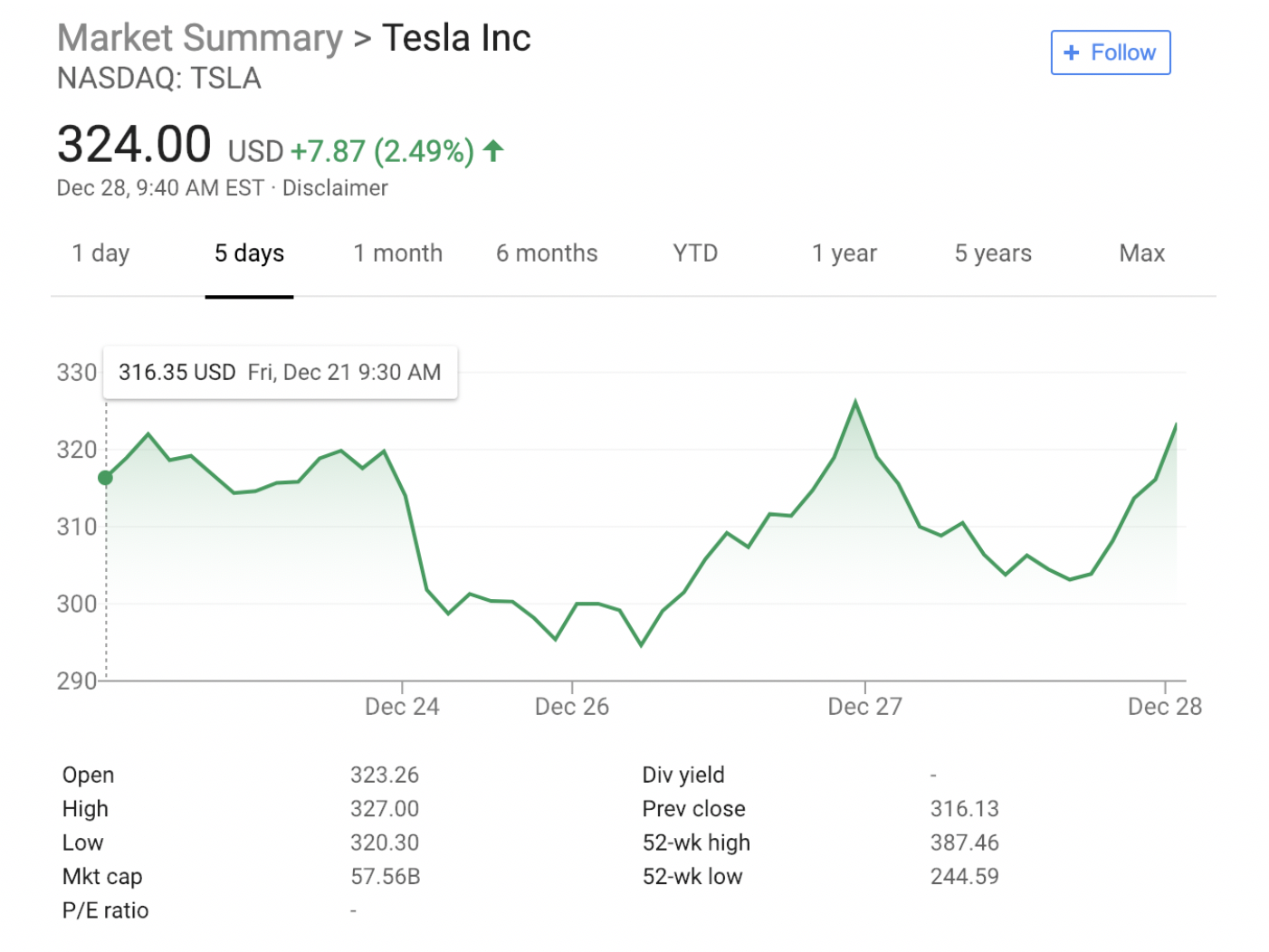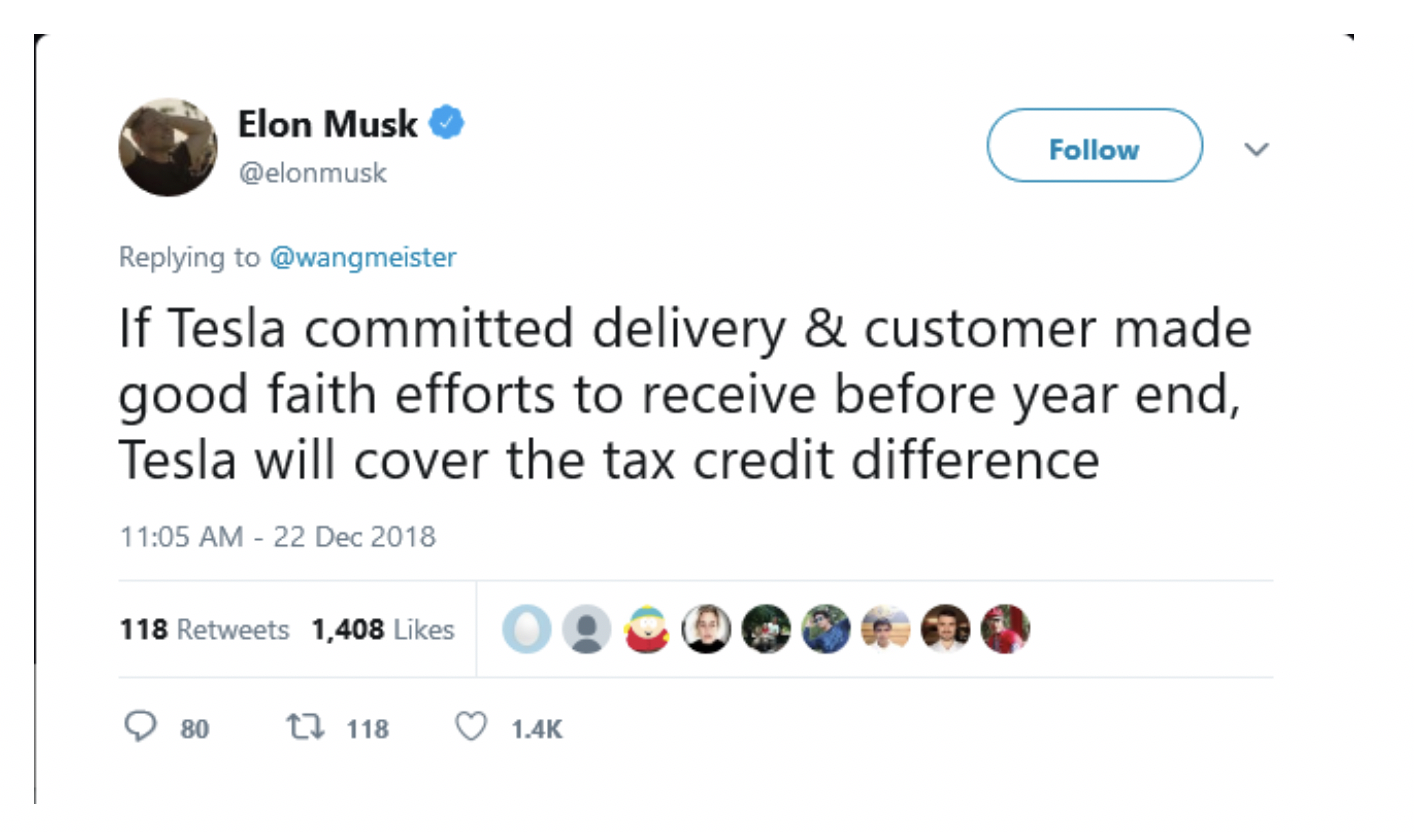After an exceptionally fruitful day on Wednesday, Tesla Inc. (NASDAQ:TSLA) shares were slammed on Thursday after CEO Elon Musk took to Twitter and reiterated that the company still planned to honor an earlier pledge to grant full tax credits to customers facing delays in delivery of their orders.
Musk revealed that Tesla “will cover the tax credit difference” for customers experiencing production delays even after the new tax law--which will halve tax credits from $7,500 currently to just $3,750--takes effect on Jan. 1, 2019.
The company had earlier pledged that customers who had placed orders by Oct. 15 would not only receive their cars by year-end but full tax credits, too.
Tesla’s Model 3 has been plagued by numerous production delays prompting a litany of complaints from long-suffering customers still waiting for their orders to be filled.
TSLA stock is down 5.5 percent in intraday trading Thursday amidst a broad market selloff that has seen the S&P 500 slip two percent. The EV maker’s shares had rallied 10.3 percent on Wednesday in one of the stock’s biggest one-day gains. The stock has now slipped back into the red in the year-to-date.
By 9:40am ET, at the market open Friday, Tesla stock was recovering from Thursday’s pummeling:

(Click to enlarge)

(Click to enlarge)
Saving China
The generous tax credit offer, however, was not the only plausible reason for the selloff. Related: Tesla Cuts Prices As China Suspends Auto Tariffs
Reports that the company had, for the third time in two months, cut vehicle prices in China must have rung the alarm bells with investors.
Tesla has now slashed Model 3 prices by up to 7.6 percent, yet the starting price is still a princely 499,000 yuan ($72,000).
Earlier this month, the company cut prices on the pricier Model S and Model X after China’s finance ministry announced that it would suspend any additional tariffs on U.S.-manufactured vehicles and auto parts beginning January.
In all honesty, Tesla’s China price concessions seem like the right thing to do if the company is to avoid losing the world’s biggest auto market altogether. Tesla needs to find a way to absorb some of the impacts by the tariff wars between the U.S. and China by making cars more affordable for the average Chinese.
A China Passenger Car Association official told CNBC that Tesla’s sales in China had plunged a jaw-dropping 70 percent in the month of October compared to last year’s corresponding period. Data from the industry body showed that Tesla sold a measly 211 cars in the country, a mere 1 percent of the 20,325 total units it shipped during the month according to Inside EVs.
The EV maker blamed tariff hikes on auto imports for the sad state of affairs. In July, Beijing raised tariffs on U.S. auto imports by 40 percent as trade tensions between the two countries continued to escalate.
Related: North America’s Largest Diamond Ever Discovered In Canada
The tariffs have had a dramatic impact on prices of vehicles originating from the U.S., with Quartz reporting that prices had increased more than 20 percent across the board after the country implemented the first 25-percent tariff, with a basic Model S 75D going for 849,000 yuan ($129,000) compared to just $75,00 in the U.S.
Shunning Profits for Growth
Tesla is certainly doubling down on efforts to grow its Chinese market.
According to a report by Reuters, the automaker has set up a financial leasing company in Shanghai’s free trade zone in an effort to speed up uptake. The $30-million facility will be involved in asset financing and consultancy. But even more impressive is the $2-billion gigafactory that the company plans to build in the city to bolster its presence in the country and region.
Maybe what investors need to do is to recalibrate their expectations about Tesla.
The company appears to have taken a cue from Amazon Inc’s (NASDAQ:TSLA) playbook of shunning profits for growth first. It’s a minor miracle that Tesla was able to deliver on Musk’s promise to deliver a profit during the last quarter in the midst of all the snafu, though sale of tax credits to Nevada casinos might have helped pad the bottom line a little bit.
By Alex Kimani for Safehaven.com
More Top Reads From Safehaven.com
















